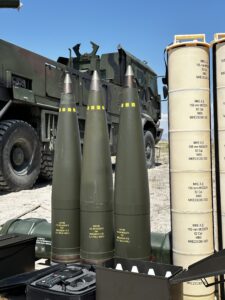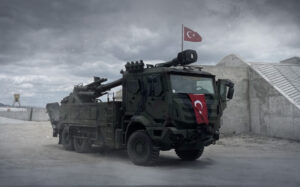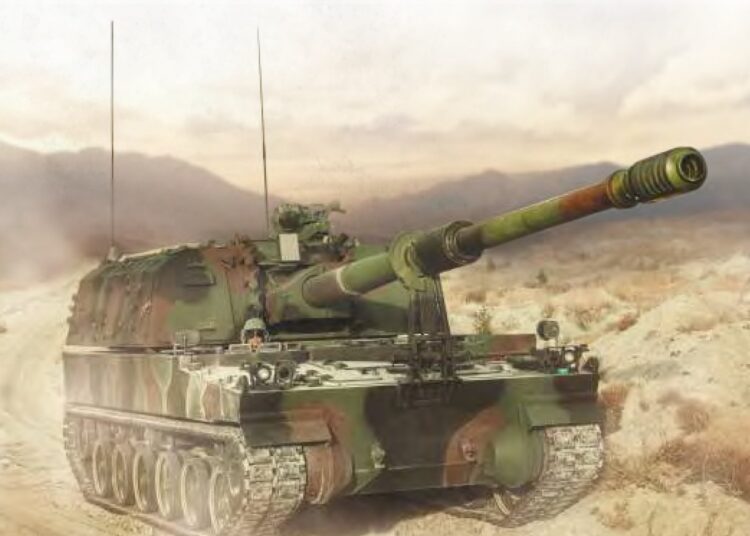Abdullah Bozkurt/Stockholm
In a further sign of Turkey’s growing militarization and global defense ambitions — underscored by its expanding involvement in conflicts beyond its borders — the state-owned conventional arms manufacturer reported $1.2 billion in revenue last year, with nearly $1 billion earmarked for infrastructure expansion and technology transfer.
Makine ve Kimya Endüstrisi Anonim Şirketi (Mechanical and Chemical Industry Corporation, MKE), wholly owned by the Turkish state, reported increased revenue driven by strong demand from both domestic and international markets, with 47 percent of its earnings coming from domestic customers and 53 percent originating with foreign clients.
The revelations were made by MKE General Manager İlhami Keleş during a closed session of a parliamentary committee on April 16. According to the minutes obtained by Nordic Monitor, Keleş stated that the company had secured long-term defense contracts, positioning itself as a cornerstone of Turkey’s national security strategy.
“We surpassed the billion-dollar revenue mark for the first time in our history,” he told members of the Committee for State Economic Enterprises. MKE’s exports have soared from $40 million in 2021 to $639 million in 2024, a sixteen-fold increase in just three years. This export surge has been accompanied by an ambitious investment strategy to meet the growing demand from both the Turkish military and foreign clients.
This development puts MKE — once a state enterprise operating at a loss — among the leading players in Turkey’s defense industry, which exported goods worth $7.1 billion last year, projected to reach $8.5 billion by the end of this year.
Excerpts from the April 16 parliamentary committee meeting on MKE:
Turkey’s engagement in internal conflicts in Libya and Syria, along with bilateral disputes between Azerbaijan and Armenia and between Pakistan and India, has significantly accelerated the growth of its defense industry. The state-owned manufacturer MKE has exported large quantities of conventional weaponry to these conflict zones, supplying allied Islamist groups in Libya and Syria as well as to countries including Pakistan and Azerbaijan.
At the same committee meeting, Deputy Defense Minister Alpaslan Kavaklıoğlu confirmed the benefits for Turkey’s engaging in foreign conflicts. He said Turkey’s recent military engagements in Syria, Libya and Azerbaijan have driven new demand and opportunities for defense production.
He further noted that the Ukraine-Russian conflict presented more opportunities for Turkey. “The most significant shift, however, came with the Russia-Ukraine war,” said Kavaklıoğlu. “It revealed the vulnerability of Europe’s conventional military readiness and created a new market for weapons systems, prompting the EU to allocate €800 billion for defense spending over the next decade.”
Kavaklıoğlu announced that Turkey plans to tap into this budget, with MKE preparing to establish new subsidiaries and partnerships in Europe. “We are actively working on setting up joint ventures across the continent. This will strengthen our domestic industry and open new avenues for exports.”

The MKE now ranks first in Turkey’s defense sector for investment volume and third across all industries. MKE’s ability to produce entire weapons systems “from end to end” — including their ammunition and even raw energetic materials — is its competitive edge, according to its general manager.
“We can offer what other countries require consortia to deliver,” Keleş stated, noting how this unique edge boosts both competitiveness and strategic partnerships. MKE has already established a presence in the Balkans, Middle East and North Africa, and Central Asia with a number of defense contracts and joint ventures.
MKE’s facilities span eight strategic locations in Turkey, with 10 factories and three additional production sites. Its capabilities range across a comprehensive spectrum of conventional arms. The light weapons factory in Kırıkkale produces small arms of the highest quality, comparable to those used by the most modern armies.
The Çankırı arms factory manufactures medium-caliber weapons ranging from 12.7 mm to 105 mm. The heavy weapons factory is responsible for producing 60 mm, 81 mm and 120 mm mortars as well as howitzers, including 105–155 mm Fırtına howitzers and ALTAY tank cannons.
The factory’s naval group also produces 76 mm naval guns and is working on 127 mm (5-inch) naval artillery. The machinery technology factory produces these naval guns in addition to electronic countermeasure systems, masks, filters and protective equipment against CBRN (chemical, biological, radiological and nuclear) threats.
The Gazi ammunition factory handles the production of small-caliber ammunition ranging from 5.56 mm to 20 mm. The Kırıkkale ammunition factory manufactures a wide range of calibers from 25 mm to 203 mm, including aerial bombs, grenades and fuses.

The rocket and explosives factory in Elmadağ produces anti-tank ammunition, mine-clearing explosives and rocket systems such as 107 mm and 122 mm multiple launch rocket systems (ÇNRA). It also hosts the energetic materials research center and is developing munitions for drones and kamikaze drones.
In Kırıkkale, the propellant factory produces various types of propellants and modular systems. The pyrotechnics factory manufactures flare and chaff decoys for aircraft as well as other pyrotechnic items like smoke canisters and illumination flares. The steel and brass factory recycles state-collected materials, producing high-quality steel used in weapons manufacturing, especially barrel-grade steel.
A new energetic materials research center is under construction to support cutting-edge projects, including smart munition payloads and materials for drone warfare.
To sustain its rapid expansion, MKE secured long-term supply contracts through Turkey’s Ministry of Defense. Branches of the armed forces have locked in their procurement needs up to 2036, enabling MKE to plan its investments around a $7 billion order log.

MKE’s transformation hasn’t gone unnoticed internationally. In 2023, the company entered Defense News’ list of the top 100 defense firms worldwide, ranking 84th with $866 million in sales. With $1.2 billion in 2024 revenue, Keleş expects MKE to climb into the top 70 this year.
To meet surging domestic and international demand, MKE is constructing a massive new production complex on 4.7 million square meters in Kırıkkale — comparable to a small city. Another investment in Samsun, a port city on the Black Sea, will enable domestic production of nitroguanidine, a dual-use explosive precursor previously imported from northern Europe. This facility ensures raw material security and supports Turkey’s growing independence in defense production.
As geopolitical tensions intensify and global demand for conventional munitions soars, fueled by conflicts such as the Russia-Ukraine war, Turkey is carving out a growing role in the global arms market. The country appears increasingly willing to engage in foreign conflicts, using them to sustain its defense industry and capitalize on the economic benefits of escalated warfare.












